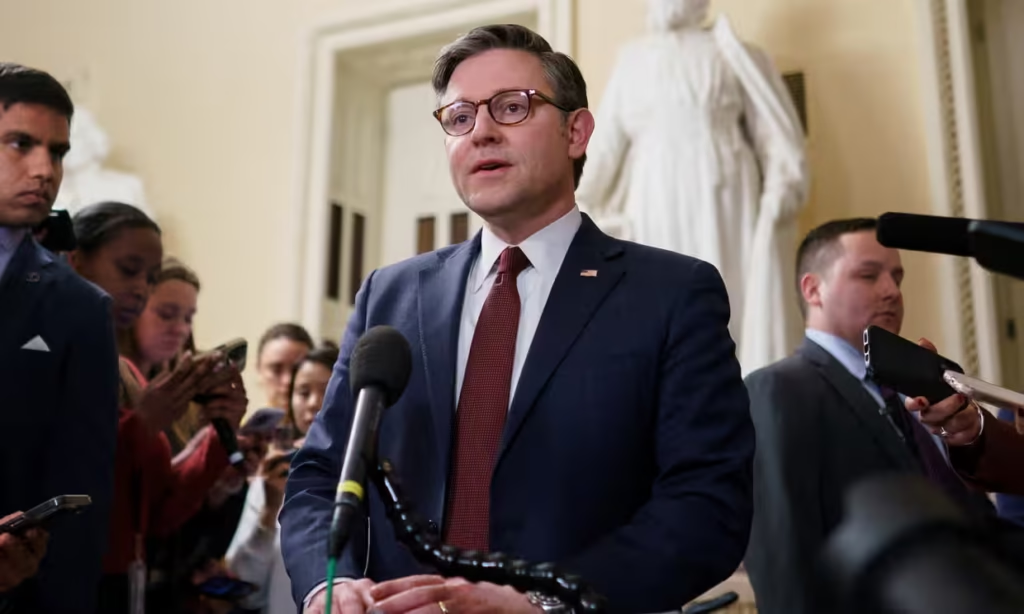The House of Representatives has narrowly approved a Republican spending bill endorsed by former President Donald Trump, passing with a 217-215 vote. The bill, which has generated intense debate, includes significant tax cuts, increased defense and border security funding, and substantial reductions in federal spending. This legislation reflects the priorities of the Trump-aligned GOP and signals a major shift in fiscal policy, with far-reaching implications for the economy, social programs, and international relations.

The bill, considered a cornerstone of Trump’s post-presidency influence on Republican policymaking, includes several key provisions:
- Tax Cuts: The legislation extends and expands tax cuts originally implemented during Trump’s presidency, reducing corporate tax rates and offering deductions for high-income earners. Supporters argue that these cuts will stimulate economic growth, while critics contend that they disproportionately benefit the wealthy and could exacerbate income inequality.
- Defense and Border Security: The bill significantly increases funding for the military, allocating billions of dollars to defense programs, weapons modernization, and troop salaries. It also prioritizes border security by increasing funding for border patrol agents and constructing additional barriers along the U.S.-Mexico border.
- Spending Reductions: To balance the budget, the bill mandates deep spending cuts across various federal programs. This includes reductions in Medicaid, food assistance programs, and climate change initiatives. Critics warn that these cuts could have severe consequences for vulnerable populations.
- “Gold Card” Citizenship Program: The bill introduces a controversial “gold card” visa initiative, which offers a pathway to U.S. citizenship for wealthy foreigners willing to invest $5 million. While proponents argue that the program will attract global investment, experts have raised concerns about its viability and the potential for tax evasion and corruption.
- Foreign Aid and International Relations: The bill follows Trump’s directive to cut foreign aid, significantly reducing U.S. contributions to international humanitarian programs. One of the most affected areas is HIV prevention initiatives in Lesotho and other regions, leading to concerns about the global fight against infectious diseases.

he passage of the bill has sparked a heated response from lawmakers, advocacy groups, and international partners.
Republican Support
Republicans aligned with Trump have hailed the bill as a victory for conservative fiscal policy. House Speaker Mike Johnson emphasized that the legislation fulfills campaign promises to reduce government spending and strengthen national security.
“This bill ensures that taxpayer dollars are spent wisely, securing our borders, strengthening our military, and supporting economic growth through tax relief,” Johnson stated.
Democratic Opposition
Democrats have condemned the bill, arguing that it prioritizes tax cuts for the wealthy while slashing essential social programs. House Minority Leader Hakeem Jeffries criticized the bill as “a direct attack on working-class Americans.”
“This legislation gives tax breaks to billionaires while taking food off the tables of struggling families and cutting healthcare access for millions,” Jeffries said. “It is unacceptable and demonstrates misplaced priorities.”
Legal and Advocacy Challenges
Several environmental advocacy groups are preparing legal challenges against the bill’s policy rollbacks, particularly those affecting climate change initiatives and regulatory protections. Organizations such as the Sierra Club and the Natural Resources Defense Council argue that these changes will accelerate environmental degradation.
Healthcare and social welfare organizations have also raised concerns about the spending cuts, warning of increased poverty and declining public health outcomes.

U.S.-Russia Relations
Efforts are underway to restore diplomatic relations between the U.S. and Russia, which have been strained in recent years. Trump-aligned policymakers believe that reducing foreign aid commitments could create leverage in negotiations with Russia. However, critics worry that withdrawing U.S. support from international development programs could weaken America’s global standing.
Impact on U.K. and European Relations
The U.K. Prime Minister is scheduled to meet with Trump to discuss increased defense budgets and potential agreements related to Ukraine. The bill’s passage signals a shift in U.S. foreign policy that may impact NATO alliances and international defense cooperation.
Concerns Over Power Africa Initiative
The Trump-backed bill dismantles the Power Africa initiative, a program launched during the Obama administration to expand electricity access in sub-Saharan Africa. Critics argue that eliminating this initiative undermines U.S. influence in the region and could create opportunities for China to expand its economic and political reach.
Corporate and Economic Reactions
Business Community Support
Many business leaders and Wall Street investors have welcomed the tax cuts, expecting them to boost corporate profits and economic growth. However, concerns persist regarding the long-term impact of reduced federal revenue on infrastructure and public services.
Elon Musk and Federal Cost-Cutting Measures
Elon Musk’s cost-cutting measures have also come under scrutiny, as federal employees are now required to justify their positions as part of a broader effort to reduce government spending. Some argue that these measures could lead to significant job losses and decreased efficiency in federal agencies.
Conclusion
The passage of the Trump-backed spending bill marks a defining moment in U.S. fiscal policy, signaling a shift toward reduced government spending, increased defense funding, and controversial economic initiatives. While Republicans celebrate the bill as a triumph for conservative principles, Democrats and advocacy groups warn of its potential harm to social programs and international relations. As legal battles and political debates continue, the long-term impact of this legislation remains uncertain.


